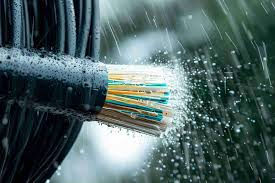NETWORK-INDUCED FINANCIAL LOSSES – Pains, Lessons and Remedies.
- bondash
- Oct 23, 2025
- 4 min read

Multilinks in Nigeria (now extinct), BT Openreach in UK, ABSA in South Africa, Vodafone UK, Safaricom in Kenya are few of several corporations that reportedly suffered network outages for diverse periods at one time or the other in their histories.
These incidents are often unpleasant, painful and debilitating!
The customers of the companies lose access to critical services & both (company and customer) often lose inordinate amounts of money running into millions of pounds or dollars, as relevant engineers and technicians scurry to restore services. Some Service Providers reportedly expended millions of dollars to overhaul their cable network to forestall recurrences.
Many of the companies also lost brand loyalty during these unfortunate events!
In high-performance Telecomms, Data Centre, and Enterprise Network environments, Structured Cabling Systems form the physical backbone of digital communication. Yet, while active devices like routers and switches receive frequent upgrades, the passive cabling layer often goes unnoticed — until it fails.
Common causes of failure are ravenous rodents’ action, moisture concentration from flooding and other sources, construction accidents, corrosion of cable joints, presence of static electricity and a host of others.

To avoid suffering of the aforementioned fates, firstly, we recommend you procure and use only premium quality cables such as 100% copper cables, NOT Copper-clad aluminium cables. Manufacturers such as Commscope, Furukawa and Siemon are well-known for top quality copper and fibre cables.
Secondly, regular maintenance of your copper and fibre optic cabling infrastructure is essential to ensure network reliability, minimize signal degradation, and extend system lifespan.
Why Maintenance Matters
Even premium-grade cabling can degrade over time due to mechanical stress, environmental exposure, and improper handling. Common issues include:
Improper organisation, labelling and documentation of cables in racks, ducts, under raised floors and data outlets which can, over time, lead to errors by support engineers.
Connector/fibre splices contamination by dust, dirt, oil, fingerprint during installation etc, leading to optical loss or intermittent connectivity.
Cable bending or crushing that alters impedance and signal integrity.
Poor grounding or shielding introducing Electro-Magnetic Interference (EMI).
Thermal and moisture stress causing attenuation and long-term degradation. Moisture can be introduced during fibre blowing. Fibre Blowing is a state-of-the-art method that uses compressed air to facilitate the installation (or blowing) of the fiber-optic cables into Microducts aka Microcables.
Static electricity charge can be created on a connector during Fibre Blowing. This causes the connector to attract airborne particulate and locks it onto the connector’s end-face. The condition gets worse in dry, low-humidity conditions such as during Harmattan.
Damage by rodents.
Accidental damage by construction workers often due to lack of availability of proper documentation of cabling routes.
Routine inspection and testing detect these anomalies before they escalate into costly downtime.




Key Maintenance Practices
A comprehensive maintenance programme should include:
Visual inspections of patch panels, racks, trays, ducts, under raised floors, last mile links etc for physical integrity.
Optical Time-Domain Reflectometer (OTDR) tests for fibre link performance.
Cleaning of fibre optic connectors using the right tools only such as Lint-free wipes, Optical-grade, fast-drying, static-dissipative cleaning fluid, single-use connector cleaning tools like cleaning sticks and mechanical click-to-clean tools, Fiber optic inspection scope etc.
Reorganisation of cables in racks, under raised floors, trays and ducts to get rid of kinks, knots, locks and thereby ensure proper airflow and reduction of cooling/electricity costs.
Proper labelling and certification testing for copper (Cat5e, Cat6, Cat6A) using calibrated field testers and for fibre.
Cleaning and re-termination of connectors as needed.
Documentation updates — reflecting any additions, relocations, or changes.
Implementing a preventive maintenance schedule minimizes reactive repairs and enhances network uptime.



Business Impact
As shown above, inadequately maintained cable plants can cause:
Increased mean time to repair (MTTR) during outages.
Hidden signal losses reducing overall throughput.
Poor performance in high-speed IP networks thus disrupting data, voice and video transmission.
Conversely,adequate structured cabling maintenance ensures predictable performance, compliance with industry standards (TIA/EIA, ISO/IEC), and supports scalability.
The cabling system is not just wiring — it’s the foundation of your network infrastructure. Regular preventive maintenance secures performance, protects your investment, and ensures uninterrupted connectivity.
Contact us today to schedule a comprehensive cabling system audit and maintenance programme tailored to your facility.
Telephone: +234 904-CASPIAN (+234 904-2277426)
IG/FB: @caspianservicesltd
X: caspiangroup




Comments